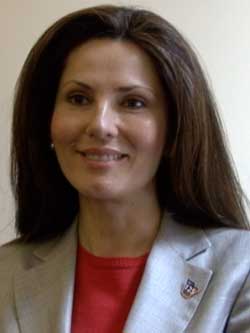Filed Under > Convocation
Martha Santaella Sud: Developing Strategies to Help Students Swim
Martha Santaella Sud Is Developing Strategies to Help Students Swim
Growing up in Caracas, Venezuela, Martha Santaella Sud learned to swim by being thrown into the Caribbean from the beaches of Oricao during high tide. “You could not afford to sink,” says Sud, who received her master’s degree in TC’s Reading Specialist Program in the Health and Behavior Studies Department in May. “So you either floated or swam like a shark.”
That experience came in handy when Sud immigrated at age 15 to Arlington, Virginia, where, as she puts it, she found herself dumped into her Catholic high school’s English-only, mainstream classes. Having learned English as a child, Sud swam. She excelled in high school and went on to earn a bachelor’s degree in political science from New York University.
While raising two sons who are now teenagers, Sud became active in her local public school system in Connecticut. She began as a volunteer reading tutor at a school where half the children were English language learners. She started to wonder how her students, who were not multilingual as she had been, were getting by. Her heart went out to the teachers, too.
“I was mystified as to how one classroom teacher could be expected to work in a classroom with English language learners, special education kids and kids who had difficulties in decoding or behavioral issues,” she recalls. “I said, ‘Wow – there has got to be a scientific, diagnostic approach to this.’”
During her time at TC, Sud offered individualized remedial instruction in reading and writing to English language learners at TC’s Dean-Hope Center for Educational and Psychological Services. Reflecting the philosophy of the Health and Behavior Studies Department that health and learning are inextricably linked, Sud says she often began by asking students if they had slept and eaten properly or “exercised enough to get the dopamine boost in the brain.” She also provided English-to-Spanish translations to the students’ families so they could follow through on the Center’s post-intervention recommendations.
Encouraged by Susan Garni Masullo, Director of Literacy Practica in TC’s Reading Specialist Program, Sud also took courses in Applied Linguistics, creating a minor concentration in second and foreign language learning. “I embraced this opportunity to fill the knowledge gap in linguistics, an area in which many teachers are ill-equipped,” she says.
Today, Sud has a thriving school-based practice giving remedial reading and writing and English-language instruction to students in grades 4-6.
“I enjoy the collaborative, diagnostic and holistic approach to helping my students realize their potential,” she says. “I also try to preserve the engagement and motivation which are critical for lifelong learning.”
Meanwhile, Sud hopes to return to TC to study cognitive neuroscience as basis for “informing students’ families and teachers about strategies and interventions to develop cognitive skills that are critical to success in school and the workplace.”
Published Friday, Jun. 7, 2013
